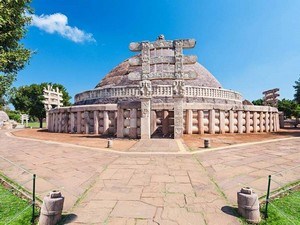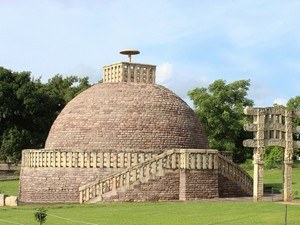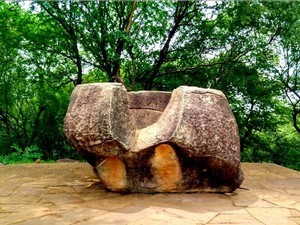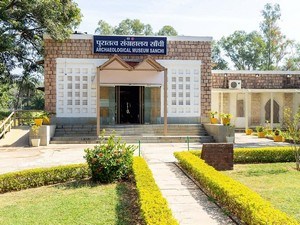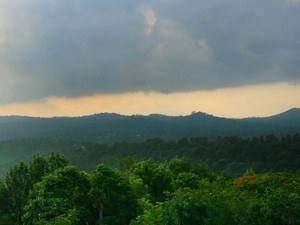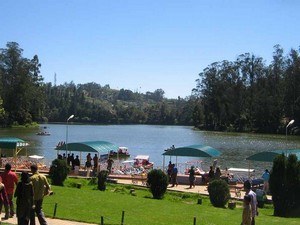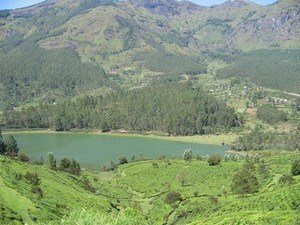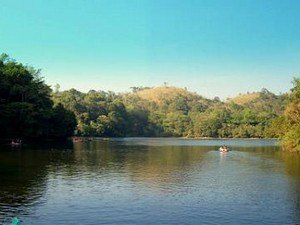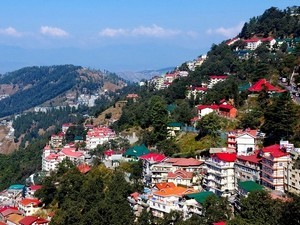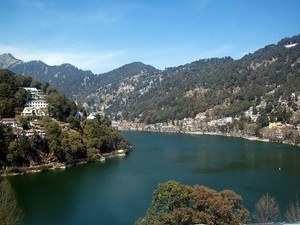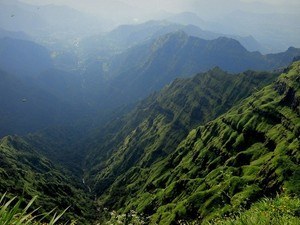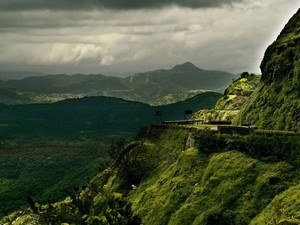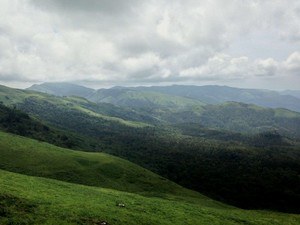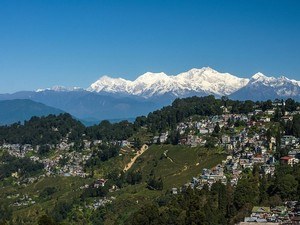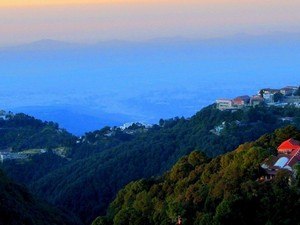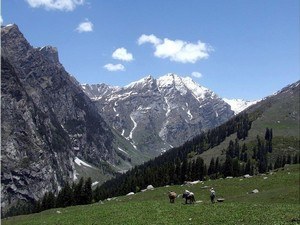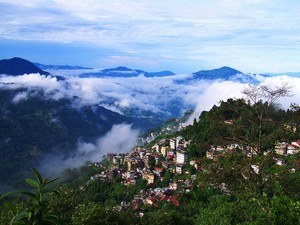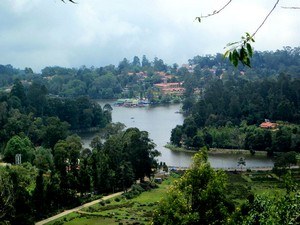DAY 1 : BHIMBETKA SIGHTSEEING & TRAVEL TO SATPURA PARK
 Historical & Heritage
Historical & Heritage
 Duration of visit: 15 Mins
Duration of visit: 15 Mins
 Timings: 7 AM - 6 PM
Timings: 7 AM - 6 PM
 Entry Fee: Bhimbetka Rock Shelter Entry: Rs. 25 for Indians, Rs. 500 for Foreigners, Rs. 100 for 2-Wheelers, Rs. 300 for Cars
Entry Fee: Bhimbetka Rock Shelter Entry: Rs. 25 for Indians, Rs. 500 for Foreigners, Rs. 100 for 2-Wheelers, Rs. 300 for Cars
At a distance of 3 km from Bhimbetka Bus Stop, Auditorium Cave is an ancient rock-cut cave situated in Bhimbetka, Madhya Pradesh. It is one of the prominent caves in the Bhimbetka Rock Shelters Complex, and among the must-include places in Bhimbetka tour packages.
Among the 15 rock shelters opened for the public, the Auditorium Cave or Cave 3 is the largest shelter, as well as the significant features of the archaeological site of Bhimbetka midst its 750 numbered shelters spread over 10 kilometers on either side and nearly 500 locations where rock paintings can be found. Surrounded by quartzite towers which are visible from several kilometers, the Auditorium Cave comprises a large horizontal tunnel roughly 25 m long leading to a cavernous high-ceilinged chamber with three passageway exits.
The whole cave gallery resembling a 'cathedral-like' atmosphere, with its Gothic arches and soaring spaces. The main entry points to the east. At the entrance, there is a boulder with a .....
 Historical & Heritage
Historical & Heritage
 Duration of visit: 1-2 Hours
Duration of visit: 1-2 Hours
 Timings: 7 AM - 6 PM
Timings: 7 AM - 6 PM
 Entry Fee: Bhimbetka Rock Shelter Entry: Rs. 25 for Indians, Rs. 500 for Foreigners, Rs. 100 for 2-Wheelers, Rs. 300 for Cars
Entry Fee: Bhimbetka Rock Shelter Entry: Rs. 25 for Indians, Rs. 500 for Foreigners, Rs. 100 for 2-Wheelers, Rs. 300 for Cars
At a distance of 3 km from Bhimbetka Bus Stop, the Bhimbetka Rock Shelters & Cave Paintings is an archaeological site situated in Bhimbetka, Madhya Pradesh. It is one of the top places of heritage in Madhya Pradesh, and among the must-include places in Bhimbetka Packages.
Designated as a UNESCO World Heritage Site in 2003, the archaeological site of Bhimbetka is situated inside the Ratapani Wildlife Sanctuary, embedded in sandstone rocks, in the foothills of the Vindhya Range. It was discovered in the year 1957, but only in the 1970s that the scale and true significance of the Bhimbetka was discovered and reported. It came under the management of the Archaeological Survey of India in 1990 and was declared a World Heritage Site in 2003.
The site consists of around 750 rock shelters distributed over 10 km (6.2 mi). The Bhimbetka group contains 243 of these, while the Lakha Juar group nearby has 178 shelters. The rock shelters and caves provide evidence of a 'rare glimpse' into .....
 Historical & Heritage
Historical & Heritage
 Duration of visit: 15 Mins
Duration of visit: 15 Mins
 Timings: 7 AM - 6 PM
Timings: 7 AM - 6 PM
 Entry Fee: Bhimbetka Rock Shelter Entry: Rs. 25 for Indians, Rs. 500 for Foreigners, Rs. 100 for 2-Wheelers, Rs. 300 for Cars
Entry Fee: Bhimbetka Rock Shelter Entry: Rs. 25 for Indians, Rs. 500 for Foreigners, Rs. 100 for 2-Wheelers, Rs. 300 for Cars
At a distance of 3 km from Bhimbetka Bus Stop, the Zoo Rock Shelter is a cave situated in Bhimbetka, Madhya Pradesh. It is one of the prominent caves in the Bhimbetka Rock Shelters Complex, and among the top places to visit in Bhimbetka as part of Bhopal Tour Packages.
Among the 15 rock shelters opened for the public, the Zoo Rock Shelter was the most exciting of all, as well as the significant features of the archaeological site of Bhimbetka midst its 750 numbered shelters spread over 10 kilometers on either side and nearly 500 locations where rock paintings can be found. Also known as Cave 4, it has a large number of animal paintings of all the caves.
There are 453 figures in this shelter comprising 252 animals of 16 different species and 90 human figures. It contains paintings from 10,000 BC - made by lime and from 5,000 - 3,000 BC that were made by vegetable colors and iron. These drawings depict an array of animals that comprise Elephants, Bison, Sambhar, all varieties .....
 Nature & Scenic
Nature & Scenic
 Duration of visit: 15 Mins
Duration of visit: 15 Mins
 Timings: 7 AM - 6 PM
Timings: 7 AM - 6 PM
 Entry Fee: Bhimbetka Rock Shelter Entry: Rs. 25 for Indians, Rs. 500 for Foreigners, Rs. 100 for 2-Wheelers, Rs. 300 for Cars
Entry Fee: Bhimbetka Rock Shelter Entry: Rs. 25 for Indians, Rs. 500 for Foreigners, Rs. 100 for 2-Wheelers, Rs. 300 for Cars
At a distance of 3 km from Bhimbetka Bus Stop, Turtle Rock is a natural rock formation situated in Bhimbetka, Madhya Pradesh. It is one of the prominent attractions in the Bhimbetka Rock Shelters Complex.
Turtle Rock in Bhimbetka is not a cave or painting of a turtle in the cave. This is a natural rock formation in the form of a turtle. Located in the middle of a wildlife sanctuary, the wilderness surrounding it is breathtaking. From this rock, one can gaze at wide stretches of the wildlife sanctuary. Looking out, one begins to imagine why this was an ideal settlement ground for the earliest inhabitants of our country. The rock shelters provided ideal vantage points to observe the nearby surrounding forests, to search for food, and also to prepare against any incoming danger.
The viewpoint holds an incredible panoramic view of the countryside below which was once a thick Jungle and Bheembetka Caves were Man's refuge from the forest and animals. Only once you come here and .....
 Historical & Heritage |
Historical & Heritage |  Pilgrimage
Pilgrimage
 Duration of visit: 15 Mins
Duration of visit: 15 Mins
 Timings: 7 AM - 6 PM
Timings: 7 AM - 6 PM
 Entry Fee: Bhimbetka Rock Shelter Entry: Rs. 25 for Indians, Rs. 500 for Foreigners, Rs. 100 for 2-Wheelers, Rs. 300 for Cars
Entry Fee: Bhimbetka Rock Shelter Entry: Rs. 25 for Indians, Rs. 500 for Foreigners, Rs. 100 for 2-Wheelers, Rs. 300 for Cars
At a distance of 3 km from Bhimbetka Bus Stop, the Bhimbetka Kuldevi Temple is an ancient temple situated in Bhimbetka, Madhya Pradesh. It is one of the top places to visit in Bhimbetka as part of Bhopal Packages.
Kuldevi Temple at Bhimbetka is dedicated to the goddess Vaishno Devi. According to history, the temple was set up by the Pandavas during their exile for their Kul-Devi, Maa Vaishno Devi. It is a large cave-temple inside a mountain. Outside the temple is a large Rock-seat that overlooks the entire valley, termed 'Bheem ki baithak'or seat of Bheem used by him, while he was in exile.
Today, the importance of the temple is that the first bonfire of Holi is lit here and when it is spotted in the plains below, the rest of Holi festivities commence. It is also known for the annual Ram Navami fair. A large number of devotees visited the temple during this time to get the blessings of Maa Vaishno Devi.
Timings: 7 AM - 6 PM
Bhimbetka Rock Shelter Entry: Rs. 25 .....
DAY 2 : SATPURA PARK SIGHTSEEING
 Wildlife
Wildlife
 Duration of visit: 4 Hours/Half Day
Duration of visit: 4 Hours/Half Day
 Timings: 6 AM - 11 AM & 3 PM - 6 PM, Closed on every Wednesday evening, on Holi, Diwali & during monsoon
Timings: 6 AM - 11 AM & 3 PM - 6 PM, Closed on every Wednesday evening, on Holi, Diwali & during monsoon
 Entry Fee: Rs. 250 for Single Seat, Rs. 1500 for Full Jeep (Max 6), Rs. 1800 - 3,600 for Jeep Rent, Rs. 360 for Guide
Entry Fee: Rs. 250 for Single Seat, Rs. 1500 for Full Jeep (Max 6), Rs. 1800 - 3,600 for Jeep Rent, Rs. 360 for Guide
At a distance of 1 km from Madhai, Madhai Zone is the core zone of Satpura National Park. This zone is one of the popular safari zones of Satpura and is primarily visited through the Madhai entrance gate, located near Madhai village.
Madhai Gate is the most popular of all the entry gates of Satpura National Park, the other being Jamani Dev Gate, Pachmarhi, Churna, and Parsapani gate. Madhai zone comprises all kinds of landscapes like valleys, plains, meadow areas, some hilly terrains, water bodies, etc. Located in the core zone, Madhai is the center for wildlife tourism in Satpura Tiger Reserve. The density of the tiger population in this zone is high.
Madhai entrance gate is situated amid of Pipariya-Bhopal route, just before Sohagpur. To access the Madhai entry gate, a boat is used to cross the Denwa River where the jeep waits for the tourists and takes them further into the jungle. There is a Forest Department Ticket counter located on the banks of Denwa River, in Madhai .....
DAY 3 : TRAVEL TO PACHMARHI & SIGHTSEEING
 Museum & Gallery
Museum & Gallery
 Duration of visit: 30 Mins
Duration of visit: 30 Mins
 Timings: 8 AM - 12 PM & 4 PM - 7 PM, Closed on Mondays
Timings: 8 AM - 12 PM & 4 PM - 7 PM, Closed on Mondays
 Entry Fee: Rs. 660 for Person without Guide & Rs. 960 per Person with Guide (inclusive of the entry fee for the museum, & other tourist attractions)
Entry Fee: Rs. 660 for Person without Guide & Rs. 960 per Person with Guide (inclusive of the entry fee for the museum, & other tourist attractions)
At a distance of 2 km from Pachmarhi Bus Station, Bison Lodge Museum is a museum located in Pachmarhi, Madhya Pradesh. Situated in the heart of the town, it is one of the oldest museums in Madhya Pradesh, and among the top tourist places in Pachmarhi.
Bison Lodge once used to be the resident of British man Captain Forsyth, who came across Pachmarhi in 1857 while leading his troop to Jhansi and settled down here. Built-in 1862, it is one of the oldest buildings in the pristine hill town of Pachmarhi. This has been turned into a lodge which is famous among the tourists who visit the forest of Satpura Hills. On the other hand, there is also a museum which is known for displaying pictures, models, and samples of flora and fauna.
The Bison Lodge Museum displays the flora and fauna of Panchmarhi in a nutshell with life-size stuffed animals like Lions, Tigers, Bison, and Crocodiles. The museum houses several pictures, models, maps, graphs, and samples of the flora and fauna on the .....
 Historical & Heritage
Historical & Heritage
 Duration of visit: 30 Mins
Duration of visit: 30 Mins
 Timings: 8 AM - 5 PM
Timings: 8 AM - 5 PM
 Entry Fee: Free
Entry Fee: Free
At a distance of 2 km from Pachmarhi Bus Station, Pandava Caves are ancient caves located in Pachmarhi, Madhya Pradesh. Situated on a hillock, it is one of the must-visit tourist places in Pachmarhi.
Pandav Caves is a group of five-rock cut temples adorned with naturally grown gardens and roughly carved columns and pilasters and is among the most sought-after Pachmarhi places to visit. According to the legend, these caves are believed to provide shelter to the Pandavas during their exile period. These attractive caves are shrouded with many stories belonging to various eras and were lastly hewn by Buddhist monks who used these caves for meditation during the 1st century AD. It is now a protected monument and tourists flock from all over India to see this place.
According to the legend, these five caves were made for each of the brothers - Yudhishthira, Arjuna, Nakul, Sahdeo, Bhima, and for their wife - Draupadi. Amongst all the five caves, 'Draupadi Kuti' is the cleanest .....
DAY 4 : PACHMARHI SIGHTSEEING
 Pilgrimage |
Pilgrimage |  Adventure / Trekking
Adventure / Trekking
 Duration of visit: 2 Hours
Duration of visit: 2 Hours
 Timings: 6 AM - 6 PM
Timings: 6 AM - 6 PM
 Entry Fee: Free
Entry Fee: Free
At a distance of 9 km from Priyadarshini Point, and 15 km from Pachmarhi Bus Station, Chauragarh Temple is a revered Hindu shrine located in Pachmarhi, Madhya Pradesh. Also known as Chota Mahadeo, it is one of the prominent places of Pilgrimage in Madhya Pradesh, and among the top places to visit in Pachmarhi.
The Chauragarh Temple is situated atop the Chauragarh Hill, the third highest peak of Pachmarhi at an altitude of 1330 m. Surrounded by spectacular hills and verdant valleys, this age-old temple is dedicated to Lord Shiva. The temple complex comprises the main temple, a Dharamshala, and a natural pond. The temple is known for the thousands of tridents stuck in the temple premises, offered by devotees over the years.
Devotees need to climb 1300 steps to reach this holy place. During Nag Panchami and Maha Shivratri festivals, devotees are seen climbing this steep path, carrying heavy Trishuls as a part of religious norms. Offering a Trishul is considered auspicious and .....
DAY 5 : SANCHI SIGHTSEEING & TRAVEL TO BHOPAL
 Historical & Heritage
Historical & Heritage
 Duration of visit: 15 Mins
Duration of visit: 15 Mins
 Timings: 6.30 AM - 6.30 PM
Timings: 6.30 AM - 6.30 PM
 Entry Fee: Sanchi Historic Site Entry : Rs.30 for Indians & SAARC Citizens, & Rs.500 for Foreigners
Entry Fee: Sanchi Historic Site Entry : Rs.30 for Indians & SAARC Citizens, & Rs.500 for Foreigners
At a distance of 1.5 km from Sanchi Railway Station, Sanchi Stupa 3 or Stupa No.3 is a Buddhist stupa located in Sanchi, Madhya Pradesh. It is one of the Buddhist monuments in the historic site of Sanchi and among the top Sanchi tourist places.
Stupa 3 is located just 100 m north of the Great Stupa, and in the 2nd century BC during the time of the Shunga rule complete with the staircase and the balustrade. As the diameter of its pedestal is about 15m, its scale is nearly the same as Stupa 2 as a whole. It is similar in design to the Great Stupa, though smaller, with a single, rather fine gateway. However, the outer wall has been lost and there remains no more than the South Torana among those of the four cardinal points at present.
The Stupa 3 has a crown on the hemispherical dome which has special religious importance. It has an umbrella made of polished stone. The single torana gateway oriented to the south is not Shunga and was built later under the Satavahanas, probably .....
 Museum & Gallery
Museum & Gallery
 Duration of visit: 30 Mins
Duration of visit: 30 Mins
 Timings: 9 AM - 5 PM, Closed on Fridays
Timings: 9 AM - 5 PM, Closed on Fridays
 Entry Fee: Sanchi Historic Site Entry : Rs.30 for Indians & SAARC Citizens, & Rs.500 for Foreigners
Entry Fee: Sanchi Historic Site Entry : Rs.30 for Indians & SAARC Citizens, & Rs.500 for Foreigners
At a distance of 1 km from Sanchi Railway Station, Archaeological Museum is a museum located within the historic site of Sanchi, Madhya Pradesh. Situated near the famous Sanchi Stupa, it is one of the must-visit places as part of the Sanchi Tour.
Also known as Sanchi Museum, the Archaeological Museum was established on the hilltop in 1919 by Sir John Marshall. Later, the Archaeological Survey of India acquired a college building at the foothill of Sanchi Stupa and got the exhibits shifted to the new building in the year 1966. The museum exhibits a large number of astonishing leftovers and artworks discovered during excavations at Sanchi itself while the rest are from its neighboring villages including Vidisha, Gulgaon, Gyaraspur, and Murelkhurd. The amazing carvings and tools made of metal showcased in the museum are around 2000 years old.
With a single floored white building, the museum comprises the main hall and four galleries besides exhibits in the verandah and a few .....



















